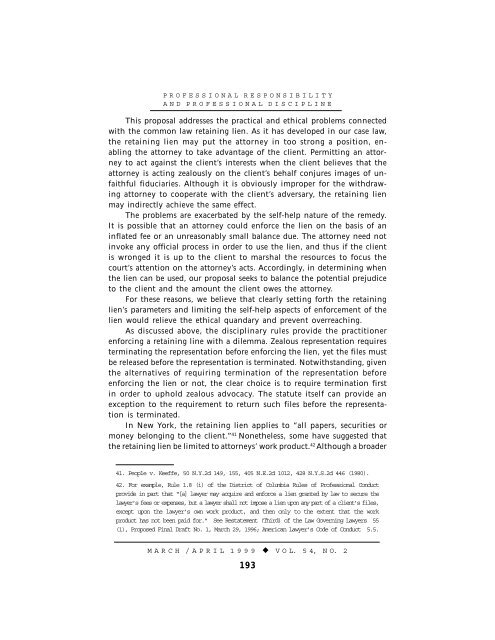THE RECORD - New York City Bar Association
THE RECORD - New York City Bar Association
THE RECORD - New York City Bar Association
Create successful ePaper yourself
Turn your PDF publications into a flip-book with our unique Google optimized e-Paper software.
P R O F E S S I O N A L R E S P O N S I B I L I T Y<br />
A N D P R O F E S S I O N A L D I S C I P L I N E<br />
This proposal addresses the practical and ethical problems connected<br />
with the common law retaining lien. As it has developed in our case law,<br />
the retaining lien may put the attorney in too strong a position, enabling<br />
the attorney to take advantage of the client. Permitting an attorney<br />
to act against the client’s interests when the client believes that the<br />
attorney is acting zealously on the client’s behalf conjures images of unfaithful<br />
fiduciaries. Although it is obviously improper for the withdrawing<br />
attorney to cooperate with the client’s adversary, the retaining lien<br />
may indirectly achieve the same effect.<br />
The problems are exacerbated by the self-help nature of the remedy.<br />
It is possible that an attorney could enforce the lien on the basis of an<br />
inflated fee or an unreasonably small balance due. The attorney need not<br />
invoke any official process in order to use the lien, and thus if the client<br />
is wronged it is up to the client to marshal the resources to focus the<br />
court’s attention on the attorney’s acts. Accordingly, in determining when<br />
the lien can be used, our proposal seeks to balance the potential prejudice<br />
to the client and the amount the client owes the attorney.<br />
For these reasons, we believe that clearly setting forth the retaining<br />
lien’s parameters and limiting the self-help aspects of enforcement of the<br />
lien would relieve the ethical quandary and prevent overreaching.<br />
As discussed above, the disciplinary rules provide the practitioner<br />
enforcing a retaining line with a dilemma. Zealous representation requires<br />
terminating the representation before enforcing the lien, yet the files must<br />
be released before the representation is terminated. Notwithstanding, given<br />
the alternatives of requiring termination of the representation before<br />
enforcing the lien or not, the clear choice is to require termination first<br />
in order to uphold zealous advocacy. The statute itself can provide an<br />
exception to the requirement to return such files before the representation<br />
is terminated.<br />
In <strong>New</strong> <strong>York</strong>, the retaining lien applies to “all papers, securities or<br />
money belonging to the client.” 41 Nonetheless, some have suggested that<br />
the retaining lien be limited to attorneys’ work product. 42 Although a broader<br />
41. People v. Keeffe, 50 N.Y.2d 149, 155, 405 N.E.2d 1012, 428 N.Y.S.2d 446 (1980).<br />
42. For example, Rule 1.8 (i) of the District of Columbia Rules of Professional Conduct<br />
provide in part that “[a] lawyer may acquire and enforce a lien granted by law to secure the<br />
lawyer’s fees or expenses, but a lawyer shall not impose a lien upon any part of a client’s files,<br />
except upon the lawyer’s own work product, and then only to the extent that the work<br />
product has not been paid for.” See Restatement (Third) of the Law Governing Lawyers 55<br />
(1), Proposed Final Draft No. 1, March 29, 1996; American Lawyer’s Code of Conduct 5.5.<br />
M A R C H / A P R I L 1 9 9 9 ◆ V O L. 5 4, N O. 2<br />
193

















